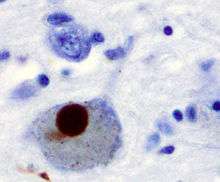Synucleinopathies
Synucleinopathies (also called α-Synucleinopathies) are neurodegenerative diseases characterised by the abnormal accumulation of aggregates of alpha-synuclein protein in neurons, nerve fibres or glial cells.[1] One prevailing hypothesis has been that the death of dopaminergic cells is the proximate cause of functional deficits.[2] However, introduction of exogenous α-SYN in a rodent animal model has been shown to induce functional deficits preceding cell death.[2]
There are three main types of synucleinopathy: Parkinson's disease, dementia with Lewy bodies, and multiple system atrophy.[1] Other rare disorders, such as various neuroaxonal dystrophies, also have α-synuclein pathologies.[1]

Because each of the synucleinopathies has a distinct set of symptoms, prognosis and management issues, it has been suggested that the term "has little practical value as a diagnostic term for the clinician."[3]
Synucleinopathies can sometimes overlap with tauopathies, possibly because of interaction between the synuclein and tau proteins.[4][5]
See also
References
- 1 2 3 McCann, H; Stevens, C. H.; Cartwright, H; Halliday, G. M. (2014). "Α-Synucleinopathy phenotypes". Parkinsonism & Related Disorders. 20 Suppl 1: S62–7. doi:10.1016/S1353-8020(13)70017-8. PMID 24262191.
- 1 2 Peelaerts W, Bousset L, Van der Perren A, et al. (Jun 2015). "α-Synuclein strains cause distinct synucleinopathies after local and systemic administration". Nature. advance online publication. doi:10.1038/nature14547. Lay summary – KU Leuven (2015).
- ↑ Martí MJ, Tolosa E, Campdelacreu J. (Sep 2003). "Clinical overview of the synucleinopathies". Movement Disorders 18 (Suppl 6): S21–7. doi:10.1002/mds.10559. PMID 14502652.
- ↑ Simon Moussaud, Daryl R Jones, Elisabeth L Moussaud-Lamodière, Marion Delenclos, Owen A Ross, and Pamela J McLean, corresponding author (October 2014). "Alpha-synuclein and tau: teammates in neurodegeneration?". Mol Neurodegener. doi:10.1186/1750-1326-9-43. PMC 4230508. PMID 25352339.
- ↑ Jing L. Guo,1 Dustin J. Covell,1 Joshua P. Daniels,1 Michiyo Iba,1 Anna Stieber,1 Bin Zhang,1 Dawn M. Riddle,1 Linda K. Kwong,1 Yan Xu,1 John Q. Trojanowski,1 and Virginia M.Y. Lee1,* (July 2013). "Distinct α-Synuclein Strains Differentially Promote Tau Inclusions in Neurons". Cell 154 (1): 103–17. doi:10.1016/j.cell.2013.05.057. PMC 3820001. PMID 23827677.